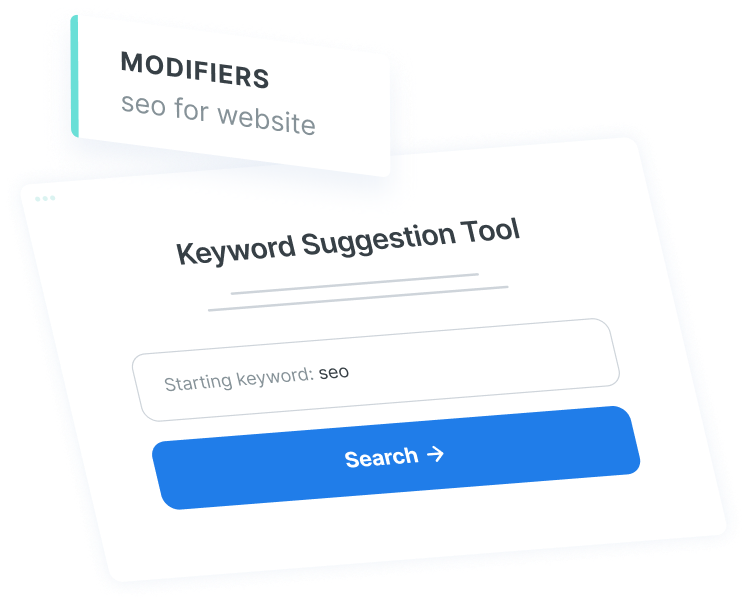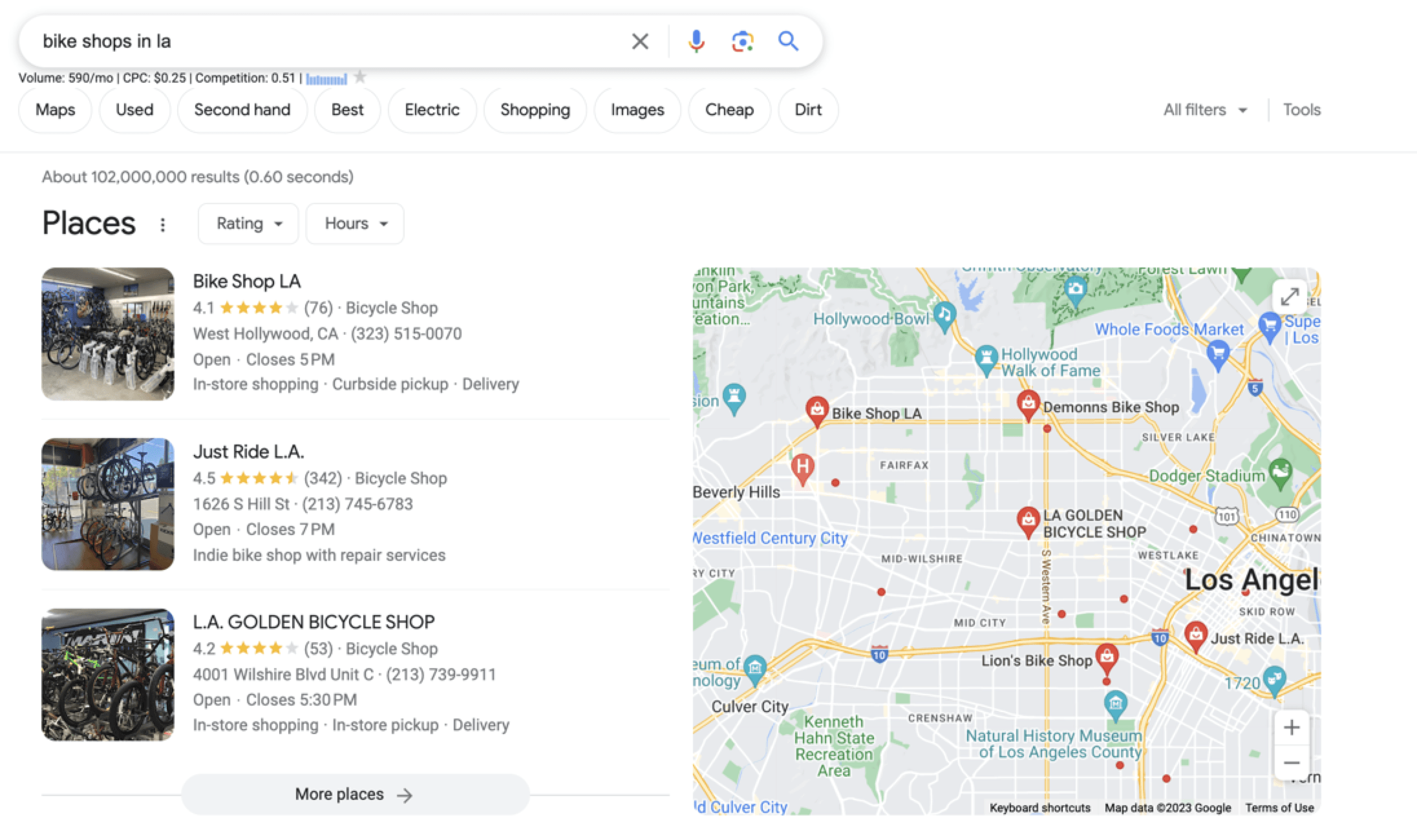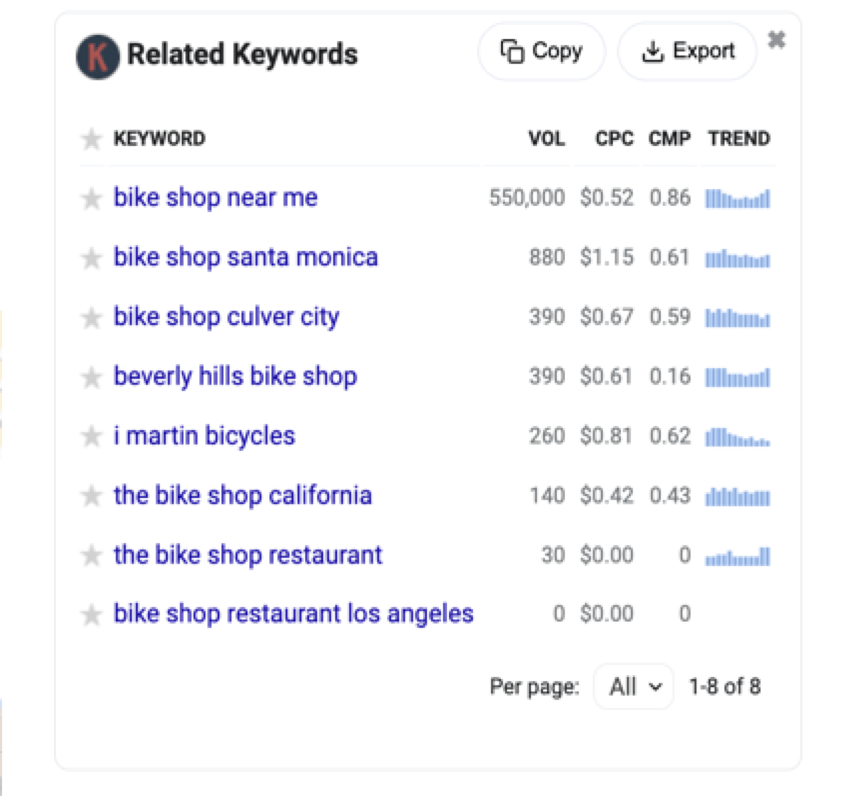-
 Published: Jul 6, 2023
Published: Jul 6, 2023
-
 7 min. read
7 min. read
-
 Abbey Stephan
Abbey Stephan Lead Editor
Lead Editor
- Abbey is a digital marketer, copywriter, and lead editor. She has worked on over 200 client campaigns and WebFX, and she specializes in marketing strategy analysis and industry-specific digital marketing plans. Outside of writing and editing, you’ll likely find her taking pictures of her cat, making a new playlist, or tending to her houseplants.
Keyword mapping is the basis for how you organize keywords on your site. However, keyword mapping is more than finding and connecting keywords — it affects your entire site structure and layout.
If you want to learn more about search engine optimization (SEO) keyword mapping, you’ve come to the right place. This post will cover the following topics:
- What is keyword mapping?
- Why is keyword mapping important?
- Keyword mapping tools
- How to do SEO keyword mapping
Read on for a guide to keyword mapping, and contact us online to speak with a strategist about your keyword research and organization processes!
Don’t miss our Marketing Manager Insider emails!
Join 200K smart marketers for the hottest marketing news and insights in your inbox.
Inline Subscription Form
“*” indicates required fields


What is keyword mapping?
Keyword mapping is building a framework for your keywords that matches your site’s structure. When you perform keyword mapping, you outline the keywords corresponding to each page.
For example, say that you sell baked goods online. You might have a page for the following keywords:
- Cookie recipes
- Cookies for sale in NY
- Chocolate chip cookies
While some pages might target the exact keywords (like the recipe page and the product page), you plan how these pages relate to give each one the best chance at ranking.
Why is keyword mapping important?
If you have any experience with SEO, you know that keywords are a critical part of your strategy. Keyword mapping helps you accomplish the following:
- Create a logical website structure: Your site needs to make sense for people to navigate it easily. Outlining your structure with keywords can help you create logical patterns and layouts.
- Outline a content plan for your site: SEO keyword mapping ensures you always have something to write about. You can use keyword research and site structure to find content gaps and create a content plan.
- Improve internal linking: Your internal linking is crucial to SEO, and with keyword mapping, you make it easier to connect relevant pages and keep users on your site.
These are just a few benefits of keyword mapping. You can also expect more conversions and revenue as your traffic and clicks increase.
Keyword mapping tools
What can you use to plan your keyword structure? Below are three keyword mapping tools to help you get started with research and organization:
- KeywordsFX: Our tool, KeywordsFX, is an excellent option for helping you find keywords that suit your topic. Enter a keyword or phrase, and KeywordsFX will show you tons of related options that match that search. You can start keyword mapping by finding associated keywords and entering them into a search engine.
- Ahrefs: After you have a few keywords, you can use Ahrefs to find parent topics and group keywords together. If you find a page or subject you want to write about, you can also enter the top page’s URL and see what keywords they use.
- SEMRush: Like Ahrefs, SEMRush has an excellent tool for finding related topics that rank well in search results. Once you enter a keyword, you can look for associated options by search volume and difficulty.
- Keywords Everywhere: This tool integrates with your browser to track keyword metrics across different pages. With Keywords Everywhere, you can see other keywords people are searching for.
Some tools let you download your keyword organization into a spreadsheet, but in general, it’s best to organize and plan your keywords in your preferred notes application.
Use our proprietary keyword research tool, KeywordsFX, to help you find high-quality keywords for content and PPC campaigns.
Identify Top Keywords for Free

How to do SEO keyword mapping
Now that we’ve covered the basics of keyword mapping, we can guide you through specifics for mapping your keywords. Here are five basic steps to keyword mapping:
- Start with one query to find related keywords
- Combine keywords that answer the same question
- Create topic groups based on keywords
- Outline pages and URLs to address topic groups
- Continue mapping keywords over time
Let’s break down each one below!
1. Start with one query to find related keywords
To begin, you can start with one keyword or search that is a good starting point for your website. This step will be your basis for finding other keywords and planning your site. You likely already have content covering the basics but need a jumping-off point.
Say you own a bike shop in Los Angeles. You might search “bike shops in la” for the following results:

If you’re using a tool like Keywords Everywhere, you can see the related terms that might also appeal to that audience:

Your list might go from “bike shops in la” to “bike shop near me,” “beverly hills bike shop,” and more. Check the People Also Ask section to see what question keywords you can target on each page.
You can also start clustering your keywords based on the intent and how the search results overlap for particular terms.
2. Combine keywords that answer the same question or search
Once you have a longer list of keywords, you can start grouping ones that answer the same search intent together.
For example, if you have “bike shops in la” and “bike shops near la” as two of your keywords, you can group those since they answer the same search intent.
This step is crucial for ensuring you don’t have too many pages addressing the same topic. If you have a page for “bike shops in la” and another page for “bike shops near la,” you could quickly run into duplicate content and lower your rankings.
3. Create topic groups based on keywords
Once you have a general idea of the keywords you want to employ, you can start grouping them by topics. This step will help you create parent pages that lead to other collections of pages.
Here’s an idea of how this might look in a table:
| Topic | Related keywords |
| Bike shop in la | Bike shops near la Bike shops los angeles Best bike shop in los angeles |
| What is a bike tune up | Bike tune up bike tune ups tools bike tune up steps |
| Bike repair in la | Bike repair shops Bike repair near la Bike repair services |
4. Outline pages and URLs to address topic groups
Once you’ve outlined your topic groups, you can plan individual pages and URLs. As you build the pages, you can also connect them and see what makes sense.
For the examples above, you might have a location page listing all your locations and then a specific page about bike shops in LA. If you write a blog post on tune-ups, you could link to a service page for your tune-up breakdown.
Your URL is also essential for including the target keyword as much as possible.
5. Continue mapping keywords over time
As your website grows, so will your keyword usage. As you find more keywords representing your site, services, and business, ensure they fit in with the rest of your site structure.
You can also periodically evaluate your website to update internal links between pages and see how your keywords connect.
Our digital marketing campaigns impact the metrics that improve your bottom line.
See Our Approach
$10 billion

24 million

7.14 million
Create a solid keyword hierarchy with WebFX
Building a complex keyword hierarchy takes time and energy, especially without any experience. Want to simplify the process? WebFX can help!
We are a digital marketing agency with years of experience in keyword research and SEO. We’ve generated $10,085,355,239+ in revenue and 24,859,684 leads for our clients — your keyword strategy could be your ticket to success.
Want to learn more? Call 888-601-5359 today to see what our services can do for your team!
-
 Abbey is a digital marketer, copywriter, and lead editor. She has worked on over 200 client campaigns and WebFX, and she specializes in marketing strategy analysis and industry-specific digital marketing plans. Outside of writing and editing, you’ll likely find her taking pictures of her cat, making a new playlist, or tending to her houseplants.
Abbey is a digital marketer, copywriter, and lead editor. She has worked on over 200 client campaigns and WebFX, and she specializes in marketing strategy analysis and industry-specific digital marketing plans. Outside of writing and editing, you’ll likely find her taking pictures of her cat, making a new playlist, or tending to her houseplants. -

WebFX is a full-service marketing agency with 1,100+ client reviews and a 4.9-star rating on Clutch! Find out how our expert team and revenue-accelerating tech can drive results for you! Learn more
Try our free Marketing Calculator
Craft a tailored online marketing strategy! Utilize our free Internet marketing calculator for a custom plan based on your location, reach, timeframe, and budget.
Plan Your Marketing Budget

SEO Success with KOA

Proven Marketing Strategies
Try our free Marketing Calculator
Craft a tailored online marketing strategy! Utilize our free Internet marketing calculator for a custom plan based on your location, reach, timeframe, and budget.
Plan Your Marketing Budget
What to read next





